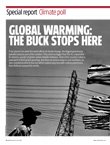Public on Climate Change: Regulate Industry, Don't Hit Our Wallets
Press and Policy Briefing on Just-Completed Survey of Public Acceptance of Policies to Limit Greenhouse Gas Emissions
|
|
|
U.S. Public on Addressing Climate Change: Regulate Industry, and Don't Hit Our Pocketbooks Too Hard June 20, 2007 A new public opinion survey of American consumers finds that most want the government to mandate specific regulations on electricity and motor vehicles -- but not at a huge cost to U.S. households. The poll of 1,491 adults conducted in the spring of 2007 was sponsored by New Scientist magazine, Stanford University, and Resources for the Future. Among the findings: |
-
Specific policies to combat global warming can command majority public support in the US, as long as they don't hit people's pockets too hard.
-
Given the probable costs, the US public has a clear preference for action in the electricity sector rather than vehicle fuel. At the lower end of the costs we quoted, all the electricity policies won majority support.
-
In contrast, none of the vehicle fuel policies gained majority backing, even at the lowest costs quoted.
-
Americans prefer standards, in which companies are told exactly what to do to curb emissions, over the other policies investigated. For example, a low-carbon standard for electricity generation was backed by 73 percent of respondents who were told it would cause a typical monthly bill to rise by $10. By contrast, a cap-and-trade scheme for power companies was backed by only 47 percent at this price point.
-
Residents of the western US are more likely to favor policies to limit global warming than those in other regions of the country. Parents and people with higher incomes are also more likely to support action.
|
"For politicians who want to find voter-friendly ways to fight global warming, our poll provides some comfort," says Peter Aldhous, New Scientist's San Francisco Bureau Chief. But there are also significant challenges ahead, not least that the "standards" preferred by the public are predicted by environmental economists to be more expensive than other policies that command less public support.
The poll cited three main ways of reducing greenhouse pollution:
|
|
Respondents were asked to choose their preferences in two sectors: vehicle fuel and electricity -- because these are each responsible for a substantial proportion of US greenhouse emissions, and because any costs of making cuts will likely be passed onto consumers. Those surveyed were told that each policy option would reduce total projected US greenhouse emissions in 2020 by five percent.
![]()
|
| ||||
|
Introduction Jeremy Webb has been the editor of New Scientist for six years. He has a degree in physics and solid-state electronics from the University of Exeter, but as a journalist has written about most fields of science. Before joining New Scientist, Jeremy worked for BBC radio as a sound engineer and a program producer before becoming a reporter on Pulse, the medical newspaper for family doctors. After a short spell in medical television, he moved to general TV news and from there to New Scientist. In the 15 years he has been with the magazine, Jeremy has worked as deputy news editor and features editor. |
||||
|
| ||||
|
Peter Aldhous, San Francisco Bureau Chief, New Scientist Peter Aldhous is San Francisco bureau chief with New Scientist magazine. He got his start in journalism in 1989 as a reporter for Nature, then fresh from a Ph.D. in animal behavior at the University of Nottingham. Subsequent positions included European correspondent for Science, and news editor at New Scientist. Prior to moving to California in 2005, he spent five years as chief news and features editor for Nature. His articles have won awards from the Association of British Science Writers, the UK Guild of Health Writers, the Association of Health Care Journalists and the Wistar Institute. He is also a part-time lecturer in the science communication program at the University of California, Santa Cruz. |
||||
|
| ||||
|
Ray Kopp, Senior Fellow, Resources for the Future Ray Kopp is a senior fellow at RFF, where for three decades he has focused on energy issues, particularly the role of fossil fuels in climate change. In recent years, his work ahs involved technological responses to climate issues and the design of domestic and international strategies to reduce greenhouse gases. His expertise has influenced the design of state and federal policies as well as those of foreign governments. Ray also has a long-standing research interest in techniques for assigning value to environmental and natural resources that do not have market prices and has assisted governments and intergovernmental organizations that were conducting damage assessments on environmental claims. He received his Ph.D. in economics from SUNY-Binghampton in 1978. |
 Real | |||
|
| ||||
|
Jon Krosnick, Frederic O. Glover Professor in Humanities and Social Sciences, Stanford University, and University Fellow, Resources for the Future Jon Krosnick is the Frederic O. Glover Professor in Humanities and Social Sciences at Stanford University; professor of communication, policy science, and psychology; director of the Methods of Analysis Program in the Social Sciences; assistant director of the Institute for Research in the Social Sciences; and principal investigator of American National Election Studies. He conducts research in three primary areas: attitude formation, change, and effects; the psychology of political behavior; and the optimal design of questionnaires used for laboratory experiments and surveys. Jon has taught courses on survey methodology at universities, corporations, and government agencies around the world. His survey research often explores the American public's views of environmental issues. He holds M.A. and Ph.D. degrees in social psychology from the University of Michigan. |
||||
|
| ||||
| Questions and Answers | ||||
Participants

Jeremy Webb

Peter Aldhous










